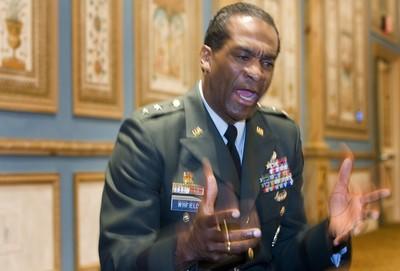‘Lieutenants’ war’ challenges general

The general in charge of the Army’s Reserve Officers’ Training Corps said Friday his sights are set on producing enough young lieutenants in the next four years to match the demand for a growing number of soldiers in Iraq to win “the hearts and minds” of locals there.
“My job is to ensure that we don’t have a platoon that shows up in Fallujah that doesn’t have a platoon leader,” ROTC commander Maj. Gen. W. Montague Winfield said following an appearance on a panel at the 100 Black Men of America conference at Paris Las Vegas.
“We’ve now gone to a war that’s a lieutenants’ and sergeants’ war, because now we’re engaging the communities,” the 53-year-old general said.
“We’re trying to make sure that we’re winning the hearts and minds of the locals, and that’s being done. So I think it’s very critical that we take a look at that with our projection of officers.”
It takes two to four years to put an officer in the field. The ROTC program accounts for two-thirds of the nation’s Army officers, with the remainder coming from the military academy and Officer Candidate School.
Winfield’s goal is to increase the number of lieutenants over time, with the biggest jump occurring in the next four years.
Winfield said his mission is to produce 4,500 officers this year, 5,100 in 2010 and 5,350 in 2011.
“What’s more important about it than just the sheer number is the fact that what we bring to our officer corps is the face of America,” he said. “What we look for is to ensure our officer corps reflects the demographics of America.”
As for the war in Iraq, Winfield said, strides have been made since February’s troop surge, despite discontent in America with casualties that have accompanied the surge.
“I don’t have to tell you that there are a lot of people dissatisfied with the direction of the war. But the good news is they still love our soldiers, sailors, airmen and Marines. And that is critical. When we lose that, then we have a serious problem.”
Winfield, the general officer in charge at the Pentagon’s National Military Command Center during the Sept. 11, 2001, terrorist attacks, said despite the troop surge, the war in Iraq is still “going to be a protracted war.”
“We’re not going to be able to complete our objectives in a matter of months. I think it will be a matter of years,” he said. “But the key is to ensure we continue to give the commanders on the ground the resources that they need in order to be successful in the objectives they have, and right now that’s being done.”
A report “in the near future” on the surge of forces will tell how successful the effort has been, he said.
Meanwhile, Winfield said, “We’re seeing some very positive things that are occurring as we speak. … Our officers are there providing guidance to the political leaders. We’re setting up power grids. We’re working sanitation systems and putting them in place.
“We’re building water sources every day. We’re making areas safe that weren’t safe before, but that doesn’t make the news.”
Winfield said he doesn’t foresee the return of the draft, because the all-volunteer Army “is working superbly. … So who is responsible for the freedoms? I will tell you they are ordinary people, men and women doing extraordinary things because they love this nation more than life itself.”